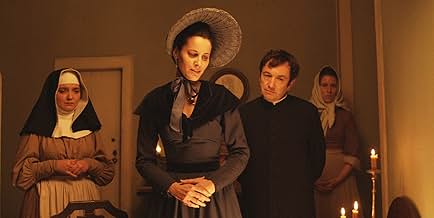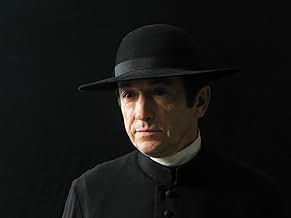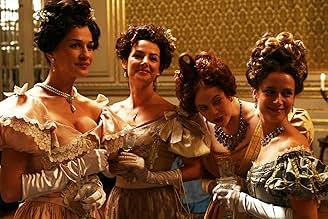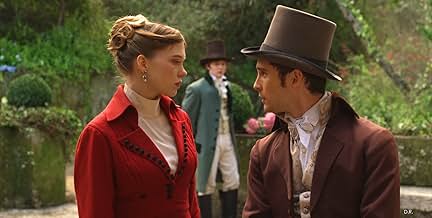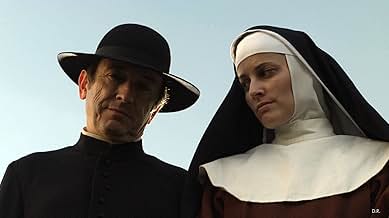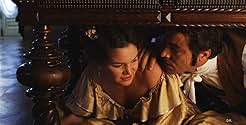IMDb-BEWERTUNG
7,4/10
3647
IHRE BEWERTUNG
Füge eine Handlung in deiner Sprache hinzuFollows a jealous countess, a wealthy businessman, and a young orphaned boy across Portugal, France, Italy and Brazil where they connect with a variety of mysterious individuals.Follows a jealous countess, a wealthy businessman, and a young orphaned boy across Portugal, France, Italy and Brazil where they connect with a variety of mysterious individuals.Follows a jealous countess, a wealthy businessman, and a young orphaned boy across Portugal, France, Italy and Brazil where they connect with a variety of mysterious individuals.
Folgen durchsuchen
Empfohlene Bewertungen
Mysteries of Lisbon in my view is utterly mesmerising, and one of those rare cases where there is no bad thing about it. As an adaptation of the novel, it succeeds wonderfully, on its own terms it is even more impressive. Mysteries of Lisbon may be lengthy at just over four and a half hours. But because everything was so well done, there was not a single moment where I was not transfixed.
On a visual standpoint, Mysteries of Lisbon looks amazing. The photography is gorgeous complete with beautiful-looking scenery and costumes, while there is an atmospheric and striking colour palette. The music does a fine job in conveying the mood of each scene, with not one scene feeling musically out of place.
Mysteries of Lisbon also benefits from a brilliant story. There are several story lines developed (very well) and incorporated throughout, but the main crux of the story told here is so unique and compelling it drew me in immediately. The script is of exceptional quality, often very moving, literate and thoughtful, while the characters have a complexity while being intriguing as well.
When it comes to the acting, there is not a single bad performance, Luz especially in the lead is fantastic. And throughout the direction is superb. Overall, this is mesmerising and highly recommended. 10/10 Bethany Cox
On a visual standpoint, Mysteries of Lisbon looks amazing. The photography is gorgeous complete with beautiful-looking scenery and costumes, while there is an atmospheric and striking colour palette. The music does a fine job in conveying the mood of each scene, with not one scene feeling musically out of place.
Mysteries of Lisbon also benefits from a brilliant story. There are several story lines developed (very well) and incorporated throughout, but the main crux of the story told here is so unique and compelling it drew me in immediately. The script is of exceptional quality, often very moving, literate and thoughtful, while the characters have a complexity while being intriguing as well.
When it comes to the acting, there is not a single bad performance, Luz especially in the lead is fantastic. And throughout the direction is superb. Overall, this is mesmerising and highly recommended. 10/10 Bethany Cox
Well this is pretty exciting stuff, four and a half hours of Raoul Ruiz back on top form. It's an adaptation of an eponymous 19th century novel by Camilo Castelo-Branco, who is a very famous author in Portugal, the first professional Portuguese author. I think that Ruiz and Castelo-Branco may have been birds of a feather, both known for being extremely prolific artists, Castelo-Branco managed to produce over 260 books whilst this movie is Ruiz's 111th. Superficially one could compare the movie to Wojciech Has' The Saragossa Manuscript (1965) in the way, in the style of Scheherazade, stories generate out of one another. But I think, given the large level of inter-relationships between the stories (what's really being revealed is a web), a more apt comparison may be to Victor Hugo's Les Misérables.
This is quite a dark movie, it opens with the description that "this work is not my child, nor my godson... this work is a diary of suffering". The young narrator says, in comparison to the other children at the religious school he's at, "I never went on outings, nor had holidays, nor presents". His presence at the school and his identity is a mystery to him, he has no last name and is known only as "Joao". His story sprouts into others, which are generally to do with love. The movie is perverse in the extreme, there is a ball at one point in the movie which sums up the atmosphere, the musicians play weird lilting African lunduns for the guests to dance to, which is the latest fashion, along with the pointing of fingers, all the while the guests maliciously gossip. This is in marked contrast to the official Catholicism of Portugal, that one never really gets any sense of in the movie. Although ones honour and reputation may be lost by a single indiscreet kiss, honour is only a thing of extreme superficiality, to be seen as honourable is to be honourable.
The length to which love annihilates the characters in the movie is quite astonishing at times, and brought me to the brink of tears. The Duchess of Cliton is a case in point, a once innocent woman, who describes herself as "mechant", and breaks the hearts of men at will. At one point, she is manipulating a portly baron, who has been nothing but kind to her, and simply bursts out in laughter, revelling in her power. She has to leave the room and then come back. The baron is totally undeterred, just as the young man who Cliton tells she is a bad woman simply refuses to believe her. Her beauty gives her a halo and power that is sheerly wicked. There's also a lot of sexual jealousy in the movie too, and the fires of this jealousy are stoked to ruination, in a way which provokes awe.
There's a sense of romantic progression from early extreme romantic sentiments, pure love, which is shattered by heartbreak, and leads either to misery or to revenge, where the person who has had their heart broken becomes a heart breaker to regain their power. There's a kind of perversity to everything, people are always spying on events from a distance, and a place of extreme duplicity is described as a "temple to sincerity", which in a way it is.
My favourite scene perhaps is set in a grand room in the University of Lisbon, which, it is pretended, is the Portuguese embassy in Rome. Two seats are bought into a room that is bare except for the most magnificent frescoes, a conversation ensues in which one man declares his intention to withdraw from life, he is to take religious orders instead of performing a cowardly annihilation of his own body. At the end of the scene the conversant withdraws and the two chairs are taken away, the man is left with nothing but the frescoes, a metaphor for his memories, which are the only thing that remains for him of the world, he focuses on part of a fresco and collapses. This is how mise-en-scene should be! Ruiz got the director of photography to watch Time Regained and a couple of other Ruiz movies beforehand. This confirms to me a suspicion that Ruiz always maintains ultimate control over the look of the movie. Here it's all trademark shooting, with elements in the extreme foreground of the shot framing action in the background, or vice versa. The camera movements in the mostly interior scenes are also extremely intricate. It's a gorgeous looking movie. The bag of tricks comes out as well, at one point a painting comes to life when Joao looks at it, in a threatful shot that can only be described as gobsmacking.
The movie has a definite colour palette, all shades of gold mostly, with dark greens and greys, yeah it's a stunner.
There is a longer version at six hours that will shortly be screened on Portuguese television. Ruiz in fact prefers the cinema version because the TV version has to have it's tempo fiddled with so that each of the six episodes it splits into ends on something of a cliffhanger. There is also one very powerful scene included in the movie which is not on the TV series, this is where it is revealed what is behind the locked door of Father Dinis.
If you liked this, prepare yourself for more. Ruiz has declared the intention to make a sequel based on the Castelo-Branco novel "livro negro de Padre Dinis" (the black book of Father Dinis). Ruiz is unstoppable, he made this highly intricate and long movie in 14 weeks, during which time he underwent surgery! Mysteries of Lisbon is an extremely special and very significant movie.
This is quite a dark movie, it opens with the description that "this work is not my child, nor my godson... this work is a diary of suffering". The young narrator says, in comparison to the other children at the religious school he's at, "I never went on outings, nor had holidays, nor presents". His presence at the school and his identity is a mystery to him, he has no last name and is known only as "Joao". His story sprouts into others, which are generally to do with love. The movie is perverse in the extreme, there is a ball at one point in the movie which sums up the atmosphere, the musicians play weird lilting African lunduns for the guests to dance to, which is the latest fashion, along with the pointing of fingers, all the while the guests maliciously gossip. This is in marked contrast to the official Catholicism of Portugal, that one never really gets any sense of in the movie. Although ones honour and reputation may be lost by a single indiscreet kiss, honour is only a thing of extreme superficiality, to be seen as honourable is to be honourable.
The length to which love annihilates the characters in the movie is quite astonishing at times, and brought me to the brink of tears. The Duchess of Cliton is a case in point, a once innocent woman, who describes herself as "mechant", and breaks the hearts of men at will. At one point, she is manipulating a portly baron, who has been nothing but kind to her, and simply bursts out in laughter, revelling in her power. She has to leave the room and then come back. The baron is totally undeterred, just as the young man who Cliton tells she is a bad woman simply refuses to believe her. Her beauty gives her a halo and power that is sheerly wicked. There's also a lot of sexual jealousy in the movie too, and the fires of this jealousy are stoked to ruination, in a way which provokes awe.
There's a sense of romantic progression from early extreme romantic sentiments, pure love, which is shattered by heartbreak, and leads either to misery or to revenge, where the person who has had their heart broken becomes a heart breaker to regain their power. There's a kind of perversity to everything, people are always spying on events from a distance, and a place of extreme duplicity is described as a "temple to sincerity", which in a way it is.
My favourite scene perhaps is set in a grand room in the University of Lisbon, which, it is pretended, is the Portuguese embassy in Rome. Two seats are bought into a room that is bare except for the most magnificent frescoes, a conversation ensues in which one man declares his intention to withdraw from life, he is to take religious orders instead of performing a cowardly annihilation of his own body. At the end of the scene the conversant withdraws and the two chairs are taken away, the man is left with nothing but the frescoes, a metaphor for his memories, which are the only thing that remains for him of the world, he focuses on part of a fresco and collapses. This is how mise-en-scene should be! Ruiz got the director of photography to watch Time Regained and a couple of other Ruiz movies beforehand. This confirms to me a suspicion that Ruiz always maintains ultimate control over the look of the movie. Here it's all trademark shooting, with elements in the extreme foreground of the shot framing action in the background, or vice versa. The camera movements in the mostly interior scenes are also extremely intricate. It's a gorgeous looking movie. The bag of tricks comes out as well, at one point a painting comes to life when Joao looks at it, in a threatful shot that can only be described as gobsmacking.
The movie has a definite colour palette, all shades of gold mostly, with dark greens and greys, yeah it's a stunner.
There is a longer version at six hours that will shortly be screened on Portuguese television. Ruiz in fact prefers the cinema version because the TV version has to have it's tempo fiddled with so that each of the six episodes it splits into ends on something of a cliffhanger. There is also one very powerful scene included in the movie which is not on the TV series, this is where it is revealed what is behind the locked door of Father Dinis.
If you liked this, prepare yourself for more. Ruiz has declared the intention to make a sequel based on the Castelo-Branco novel "livro negro de Padre Dinis" (the black book of Father Dinis). Ruiz is unstoppable, he made this highly intricate and long movie in 14 weeks, during which time he underwent surgery! Mysteries of Lisbon is an extremely special and very significant movie.
This series of short stories set in a world long gone is of course a costume drama, that may therefore deter some. They would be mistaken. It is slow, considered, colorful and in my view a good introduction to the world of our ancestors, who held opinions different from ours, did things in a different way, and got upset about the same issues, yet in a different clothing. Love that is thwarted, wise padres, noble families with poor youngest children and all of that in a heavily draped world - sometimes a bit much. And yet I may recommend that you sit down, do not hurry, leave your perhaps preconceived ideas at the entrance, and enjoy these so many hours of romantic stories.
When Raoul Ruiz adapts existing material, he tends to reconfigure the narrative in a playful way, often obliterating all coherence in the process. In his writings on film, specifically Poetics of Cinema, he is quite critical of what he calls central conflict theory. The idea behind this theory is that narrative, especially film narrative, must be built around a single conflict and that every aspect of the plot must build on this conflict one way or another. Ruiz noticed this phenomenon and gave it a name, but it was so common that popular screen writing guides used it as an incontrovertible rule. Poetics of Cinema is devoted almost entirely to explaining and criticizing central conflict theory. Ruiz was never content merely to criticize this simplistic yet ubiquitous narrative structure in writing, however; commentary on it is often embedded in the films he makes. Unsurprisingly, his films intentionally eschew anything resembling this structure but they tend to go even further and offer playful deconstructions of the concept.
Although I can't claim much familiarity with the novel Ruiz is adapting in Mysteries of Lisbon (it apparently hasn't been translated to English yet) it undoubtedly lends itself especially well to his ludic, subversive style. Rather than follow the conflict of a single continuous narrative, Mysteries of Lisbon explores several interrelated narrative strands that complement one another unusually well as they're full of cases of important coincidental relationships and frustrated love affairs. Thus, Ruiz has less to subvert and more to emphasize.
Ruiz's visual style has always been highly unusual. He favors the frequent use of Dutch angles and he often creates startling juxtapositions with his unusual framing techniques and occasional superimpositions. While these unusual techniques are always welcome, they can become somewhat exhausting when they occur frequently. Since Mysteries of Lisbon is unusually long (the version I watched was around 260 minutes) it's perhaps unsurprising that Ruiz manages to space these out carefully enough to draw attention to all the right places and break up the monotony of the more conventional period piece style he favors in this film. Even at its least inspired, however, Mysteries of Lisbon offers far more visual stimulation than the stuffy fidelity of a film by Merchant and Ivory or Oscar fodder such as The King's Speech. Unlike most directors working with similar material, Ruiz captures vast landscapes and baroque interiors with the same effortless mastery. Even the frequent long takes are made more interesting by carefully employed tracking shots.
Mysteries of Lisbon represents the rare combination of a director at the top of his game working with material perfectly suited for his unique sensibilities. Cinema doesn't get much better than this.
Although I can't claim much familiarity with the novel Ruiz is adapting in Mysteries of Lisbon (it apparently hasn't been translated to English yet) it undoubtedly lends itself especially well to his ludic, subversive style. Rather than follow the conflict of a single continuous narrative, Mysteries of Lisbon explores several interrelated narrative strands that complement one another unusually well as they're full of cases of important coincidental relationships and frustrated love affairs. Thus, Ruiz has less to subvert and more to emphasize.
Ruiz's visual style has always been highly unusual. He favors the frequent use of Dutch angles and he often creates startling juxtapositions with his unusual framing techniques and occasional superimpositions. While these unusual techniques are always welcome, they can become somewhat exhausting when they occur frequently. Since Mysteries of Lisbon is unusually long (the version I watched was around 260 minutes) it's perhaps unsurprising that Ruiz manages to space these out carefully enough to draw attention to all the right places and break up the monotony of the more conventional period piece style he favors in this film. Even at its least inspired, however, Mysteries of Lisbon offers far more visual stimulation than the stuffy fidelity of a film by Merchant and Ivory or Oscar fodder such as The King's Speech. Unlike most directors working with similar material, Ruiz captures vast landscapes and baroque interiors with the same effortless mastery. Even the frequent long takes are made more interesting by carefully employed tracking shots.
Mysteries of Lisbon represents the rare combination of a director at the top of his game working with material perfectly suited for his unique sensibilities. Cinema doesn't get much better than this.
The Mysteries of Lisbon are not so much mysteries as they are a series of conversations which always lead to some sort of revelation. These revelations are melodramatic punch lines with interlocking characters continuously finding out who their parents are, where they came from, the results of lost loves, and everything in between. If the script was written in a linear fashion with no time jumps or flashbacks, there would be no mysteries; it would just be a meandering retelling of Romeo and Juliet (and all of their cousins).
The word meandering sounds harsh and an indictment of a script which does not know where it is going. However, I mean meandering as in there are multiple lead characters to follow and each of them has a very complicated past which takes its time to tell. The Mysteries of Lisbon is four and a half hours long; the director threw out accepted norms for audience patience in favor of showing the whole story. It is based on an 1854 novel by the Portuguese author Camilo Castelo Branco and it appears it was filmed in an unabridged fashion.
The main character is a village priest, Padre Denis (Adriano Luz), who at first is indirectly involved in a couple's forbidden love affair and then purposefully injects himself into their lives and then into everyone else's life who comes into contact with their troubles. Even though the priest is the interconnecting cog in the middle of all of these characters, he is not the narrator. That role is given to an orphan the priest looks after and becomes a driving force of his own later on.
The director, Raul Ruiz, obviously loves conversations, but only deep and emotionally scarring ones. Every conversation or recounting of a previous conversation has its own 30 minute segment it seems. The characters, usually just two, sit in a room and then the scene fades into flashback on what happened in the past which will now illuminate the present. I believe the time shifts were included to create the mystery. The author deliberately created the tension of not knowing and the 'a-ha' discovery moments because he could not have accomplished the same moments with a realistic, linear timeline.
The action is mostly set in Portugal and appears to be in the early 1800s but after Napoleon. The Emperor is frequently referenced but only in the past tense. Many of the characters are nobles so the costume designer had a true feast in outfitting so many people in remarkable period dress. The Portuguese scenery and elaborate set designs are also enjoyable; somebody really took their time to make the set look intensely real. The lighting is also employed to convey a sense of realness. There seems to be no artificial lighting whatsoever. Light only comes through windows during the day and the rooms are terrifically dark at night. The candles never flicker so there must be some source of artificiality, but it is not noticeable. Unfortunately, Raul Ruiz recently passed away on 19 August. He was Chilean born but left Chile in 1973 when Augusto Pinochet took power. The Mysteries of Lisbon is his final film and is of such epic proportions it appears he was thinking about this film for a long time before he finally took the plunge.
I recommend this film, but be careful. Watch it only if you appreciate long, intense scenes of dialogue or appreciate the intricate details of period films. There is extremely little action and drawn out sequences with no words spoken at all; however, there is character with the endearing name 'Knife Eater'. If these aspects do not scare you, then sit back and enjoy because you are in for a real treat. You will not see a film like this from an American director; no studio would ever sign off on a movie this long, not if they expect it to make any money.
The word meandering sounds harsh and an indictment of a script which does not know where it is going. However, I mean meandering as in there are multiple lead characters to follow and each of them has a very complicated past which takes its time to tell. The Mysteries of Lisbon is four and a half hours long; the director threw out accepted norms for audience patience in favor of showing the whole story. It is based on an 1854 novel by the Portuguese author Camilo Castelo Branco and it appears it was filmed in an unabridged fashion.
The main character is a village priest, Padre Denis (Adriano Luz), who at first is indirectly involved in a couple's forbidden love affair and then purposefully injects himself into their lives and then into everyone else's life who comes into contact with their troubles. Even though the priest is the interconnecting cog in the middle of all of these characters, he is not the narrator. That role is given to an orphan the priest looks after and becomes a driving force of his own later on.
The director, Raul Ruiz, obviously loves conversations, but only deep and emotionally scarring ones. Every conversation or recounting of a previous conversation has its own 30 minute segment it seems. The characters, usually just two, sit in a room and then the scene fades into flashback on what happened in the past which will now illuminate the present. I believe the time shifts were included to create the mystery. The author deliberately created the tension of not knowing and the 'a-ha' discovery moments because he could not have accomplished the same moments with a realistic, linear timeline.
The action is mostly set in Portugal and appears to be in the early 1800s but after Napoleon. The Emperor is frequently referenced but only in the past tense. Many of the characters are nobles so the costume designer had a true feast in outfitting so many people in remarkable period dress. The Portuguese scenery and elaborate set designs are also enjoyable; somebody really took their time to make the set look intensely real. The lighting is also employed to convey a sense of realness. There seems to be no artificial lighting whatsoever. Light only comes through windows during the day and the rooms are terrifically dark at night. The candles never flicker so there must be some source of artificiality, but it is not noticeable. Unfortunately, Raul Ruiz recently passed away on 19 August. He was Chilean born but left Chile in 1973 when Augusto Pinochet took power. The Mysteries of Lisbon is his final film and is of such epic proportions it appears he was thinking about this film for a long time before he finally took the plunge.
I recommend this film, but be careful. Watch it only if you appreciate long, intense scenes of dialogue or appreciate the intricate details of period films. There is extremely little action and drawn out sequences with no words spoken at all; however, there is character with the endearing name 'Knife Eater'. If these aspects do not scare you, then sit back and enjoy because you are in for a real treat. You will not see a film like this from an American director; no studio would ever sign off on a movie this long, not if they expect it to make any money.
Wusstest du schon
- PatzerThe movie is set during the late 1700's to early 1800's. During the ballroom scene, several shots make it obvious that the gowns worn by the women have zippers in the back but the zipper wasn't invented until 1851.
- Alternative VersionenAlso exists as a shorter (by about an hour), theatrically released, feature film version, Mistérios de Lisboa (2010).
- VerbindungenEdited from Mistérios de Lisboa (2010)
Top-Auswahl
Melde dich zum Bewerten an und greife auf die Watchlist für personalisierte Empfehlungen zu.
- How many seasons does Mysteries of Lisbon have?Powered by Alexa
Details
- Erscheinungsdatum
- Herkunftsländer
- Offizielle Standorte
- Sprachen
- Auch bekannt als
- Die Geheimnisse von Lissabon
- Drehorte
- Produktionsfirmen
- Weitere beteiligte Unternehmen bei IMDbPro anzeigen
Zu dieser Seite beitragen
Bearbeitung vorschlagen oder fehlenden Inhalt hinzufügen



